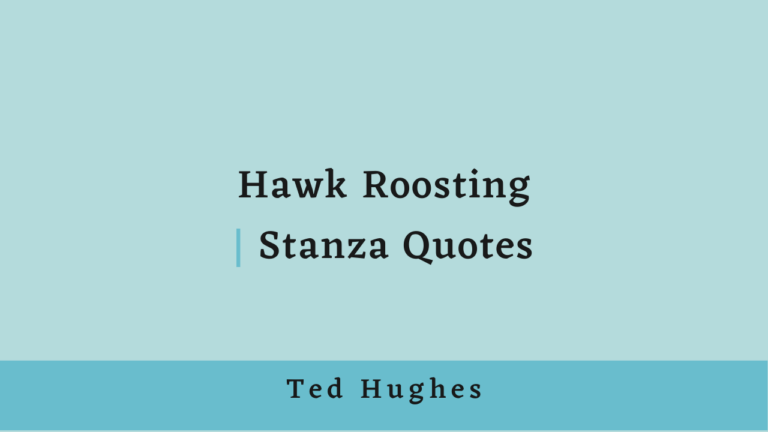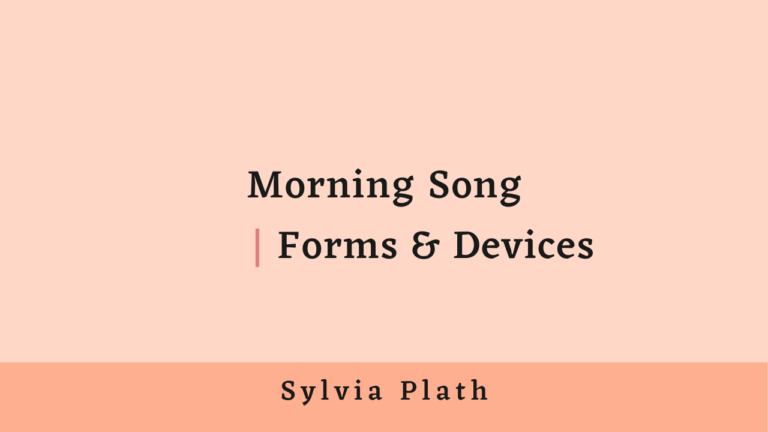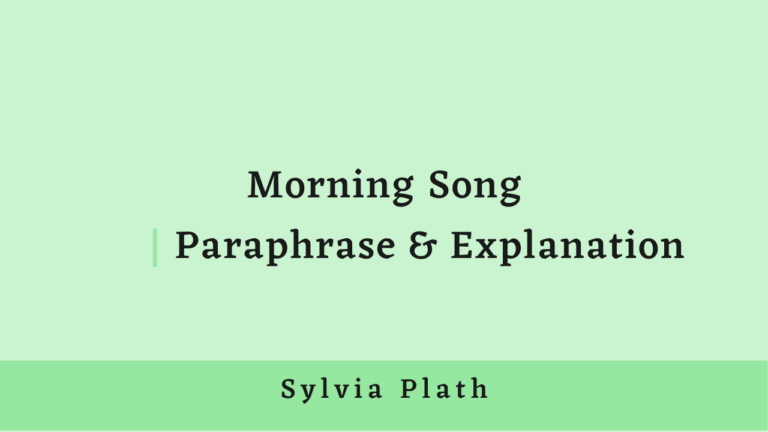Sylvia Plath’s “Morning Song” starts with rich imagery and metaphor. The first phrase “Love set you going” suggests that the child’s existence is initiated by love. It emphasizes the emotional and loving of the baby’s life. The second phrase “a fat gold watch” symbolizes the baby’s preciousness and valuable, while the “watch” refers to time, life and automated rhythm. Fat evokes a sense of healthiness and strength. Her the comparison with a watch might be suggesting the regular and routine schedule of feeding, sleeping and nurturing of the newborn.
Love set you going like a fat gold watch.
The midwife slapped your footsoles, and your bald cry
Took its place among the elements.
Our voices echo, magnifying your arrival. New statue.
In a drafty museum, your nakedness
Shadows our safety. We stand round blankly as walls.
To sum up, Plath beautifully captures the mixture of emotional depth and the realistic, routine aspects of motherhood in the opening line. It’s a powerful start that sets the tone for the rest of the poem, depicting both the wonder and the everyday realities of bringing a new life into the world.
The midwife slapping the baby’s foot soles is a physical act or a clinical action which is a common practice to stimulate the baby’s first breaths. This action represents the immediate transition from the womb to the outside world. The term “Bald cry” emphasizes the raw, plain nature of the baby’s first sound. “Bald” here means simple, pure, and primal crying sound that connects the infant to the natural world (“the elements”). Plath agrees this moment as universal and elemental, as if the baby’s cry is a foundational sound, comparable to the sound of wind or water which comes naturally.
Here, Plath’s phrase “Our voice echo” suggests that the voice of the parents are bouncing back. In other words, we can say parental response shifts with the voices amplifying the importance of baby’s presence. The verb “magnifying” further highlights the importance and intensity of the baby’s birth. It also conveys how a baby’s arrival transforms everything, making this event enormous. By using the metaphor of echoing voice and magnification, Plath conveys the significant impact to the newborn’s arrival, emphasizing the heightened emotions of joy, love and amazement in the heart of parents.
The metaphor “New statue” suggests that the newborn is like a statue, something new, precious, and to be observed. It implies a sense of awe and reverence, but also a certain distance and immobility. The baby is also seen as an object of admiration, highlighting the parents’ sense of detachment and observation. The setting “In a drafty museum” evokes a cold, impersonal atmosphere. Museums are places where objects are displayed and observed from a distance, emphasizing the feeling of emotional detachment and isolation. The “drafty museum” implies discomfort reinforcing the theme of alienation. The “nakedness” of the baby is both literal and symbolic in this poem. It represents vulnerability (nakedness) and exposure creating a sense of insecurity for the parents. The child’s presence creates a shadow over the parents’ previously safe and familiar world, introducing uncertainty and new responsibilities. The image of a “new statue” in a “drafty museum” creates a absolute contrast between the preciousness of the newborn and the cold, inhuman setting. It also highlights the parents’ sense of wonder and devotion, but also their struggle to connect emotionally.
The phrase “we stand round blankly” suggests that the parents are standing around the baby with a sense of emptiness or lack of emotion. The simile “as wall” comparing the parents to walls emphasizes their emotional distance and lack of interaction. Walls are inanimate and unresponsive, highlighting the parents’ initial inability to connect with the newborn emotionally. This moment of alienation and the challenge of forming a bond with the newborn contrasts sharply with traditional depictions of joyful parental bonding. By using the metaphor of walls, Plath powerfully illustrates the emotional distance and numbness that can accompany the arrival of a new child. The parents feel like blank walls, highlighting their struggle to build connection of bonding with their baby. This line captures the complexity of emotions that new parents often experience, including the feeling of detachment, confusion, and the challenge of forming an emotional connection.






